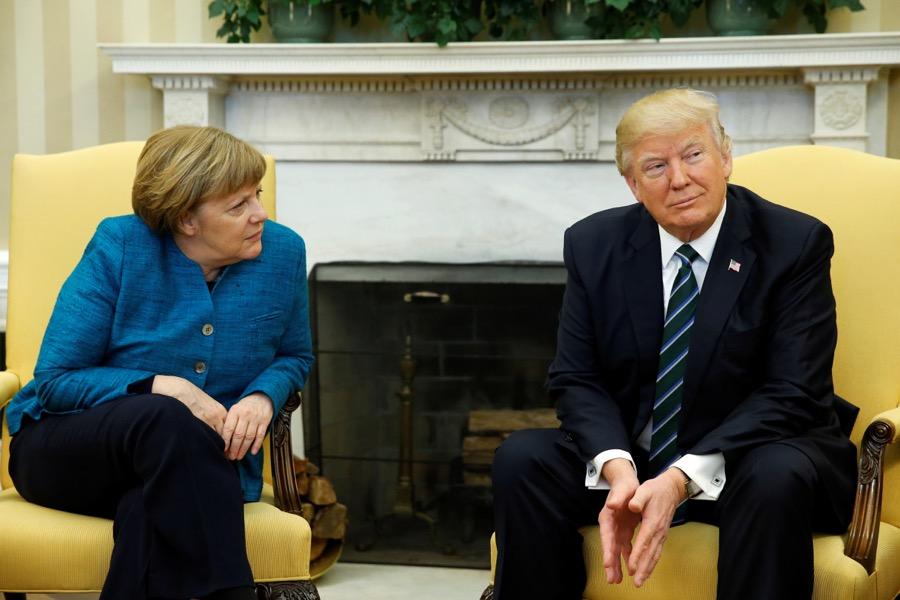Watch: Trump meets Angela Merkel at the White House
US President Donald Trump meets with Germany's Chancellor Angela Merkel in the Oval Office at the White House in Washington on March 17.
US President Donald Trump welcomed German Chancellor Angela Merkel to the White House on Friday and spoke to reporters on issues from global trade to NATO to alleged wiretapping.
Trump said he backed the NATO alliance, but stressed that some member states were not contributing enough.
The US president also said he expected relations with Berlin to feature "fair and reciprocal trade policies."
"I reiterated to Chancellor Merkel my strong support for NATO as well as the need for our NATO allies to pay their fair share for the cost of defense," Trump told a joint press conference.
"Many nations owe vast sums of money from past years and it is very unfair to the United States. These nations must pay what they owe."
He rejected a description of his policies as "isolationist," noting: "I'm a free trader but also a fair trader."
"Millions of hardworking US citizens have been left behind by international commerce and together we can shape a future where all of our citizens have a path to financial security," said the billionaire US president.
On immigration, another issue dividing the veteran chancellor and the new US president, Trump said immigration was a "privilege" and not a "right."
You can view the Wednesday news conference below.
Before coming to office, the US president called Merkel's acceptance of refugees a "catastrophic mistake" and said she was "ruining Germany."
He also demanded countries like Germany step up defense spending, a sensitive issue for a nation that has had a strong pacifist tradition since World War II and proselytizes fiscal prudence.
In a similar vein, Merkel has sought to remind the real estate mogul of democratic values.
Any "close cooperation," she once said, must be on the basis of the "values of democracy, freedom, respect for the rule of law and human dignity, regardless of origin, skin color, religion, gender, sexual orientation or political belief."
Comments like that have prompted some of Trump's fiercest critics — as well as some prominent publications — to declare Merkel the new "leader of the free world," a moniker normally taken up by the occupant of the White House.
Voice of Europe
"Germany looks toward Washington with a mixture of vulnerability and confidence," said Jeffrey Rathke of the Center for Strategic and International Studies.
"Germany is the de facto leader of the European Union, but the Union is undergoing internal and external trials that make its future uncertain," he added.
"And Germany has placed all of its security eggs in multilateral baskets."
European officials fret that Trump has too closely embraced the nationalist ideology of key adviser Steve Bannon.
Bannon who has championed trade protectionism and opposed the European Union and other multilateral institutions that underpin the world order.
Merkel is expected to raise the issue of a proposed US border tariff that would hit German manufacturers hard. To underscore the point she's brought a host of German business leaders along for the trip.
Before departing for the United States, Merkel also noted she was going to Washington as an envoy not just of Germany, but of Europe too.
"I will of course point out that for us, our country and our membership in the European Union are two sides of the same coin," Merkel said ahead of the visit.
Hours before the pair was set to meet, Germany's Economy Minister Brigitte Zypries warned that Berlin could take Washington to an international trade court if it insists on imposing punitive tariffs on German goods.
Amid the heightened rhetoric, she acknowledged that "a lot is at stake" as Merkel meets Trump on Friday, calling for clarity and "creating a reliable base" for relations to reduce the "poisonous" uncertainty clouding the economic outlook.
In a conciliatory tone, a White House official said that Trump would seek out Merkel's views on Russia.
That is a nod to her years on the international stage and experience growing up in communist East Germany, where she learned Russian.
"The president will be very interested in hearing the Chancellor's views on her experience in interacting with Putin," said the official, speaking on condition of anonymity.
"Of course she has been doing this for more than a decade," the official said. "He's going to be very interested in hearing her insights on what it's like to deal with the Russians."
Trump's own background may also help break the ice.
His family hails from Kallstadt, a tidy village nestled in southwest Germany's lush wine country.
His grandparents left for America more than a century ago fleeing poverty and later, after a brief return, trouble with the law.
Every day, reporters and producers at The World are hard at work bringing you human-centered news from across the globe. But we can’t do it without you. We need your support to ensure we can continue this work for another year.
Make a gift today, and you’ll help us unlock a matching gift of $67,000!
